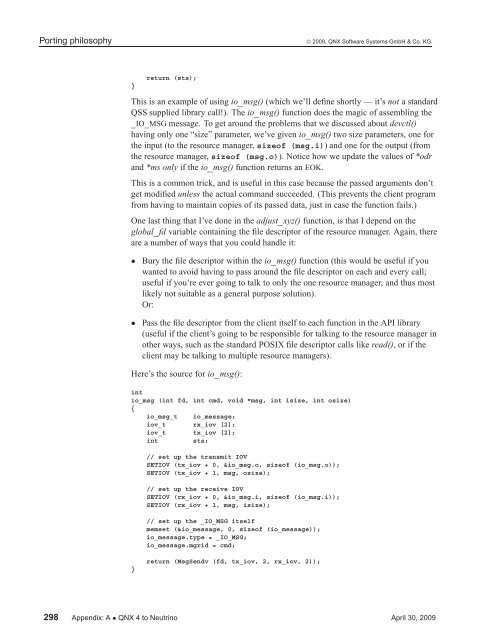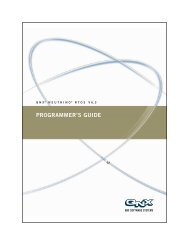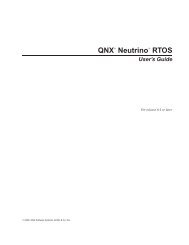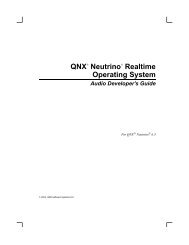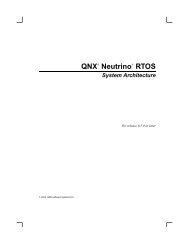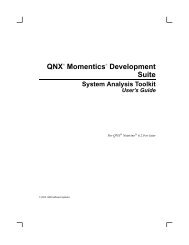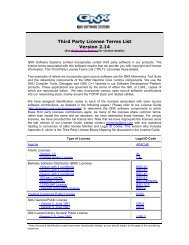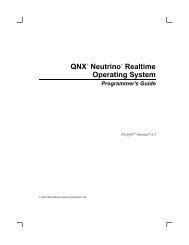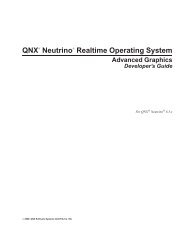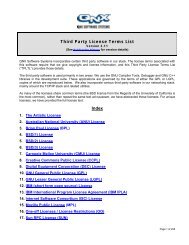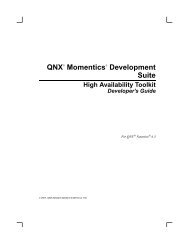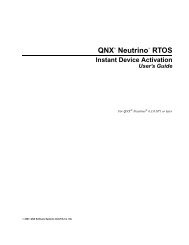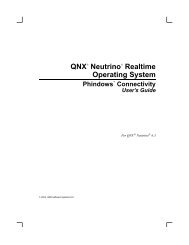- Page 1 and 2:
QNX Neutrino RTOS Getting Started w
- Page 3 and 4:
Contents About This Guide xi What y
- Page 5 and 6:
© 2009, QNX Software Systems GmbH
- Page 7 and 8:
© 2009, QNX Software Systems GmbH
- Page 9 and 10:
List of Figures A process as a cont
- Page 11:
About This Guide April 30, 2009 Abo
- Page 14 and 15:
Typographical conventions © 2009,
- Page 17:
Foreword to the First Edition by Pe
- Page 20 and 21:
© 2009, QNX Software Systems GmbH
- Page 23 and 24:
© 2009, QNX Software Systems GmbH
- Page 25 and 26:
© 2009, QNX Software Systems GmbH
- Page 27:
© 2009, QNX Software Systems GmbH
- Page 31 and 32:
© 2009, QNX Software Systems GmbH
- Page 33 and 34:
© 2009, QNX Software Systems GmbH
- Page 35 and 36:
© 2009, QNX Software Systems GmbH
- Page 37 and 38:
© 2009, QNX Software Systems GmbH
- Page 39 and 40:
© 2009, QNX Software Systems GmbH
- Page 41 and 42:
© 2009, QNX Software Systems GmbH
- Page 43 and 44:
© 2009, QNX Software Systems GmbH
- Page 45 and 46:
© 2009, QNX Software Systems GmbH
- Page 47 and 48:
© 2009, QNX Software Systems GmbH
- Page 49 and 50:
© 2009, QNX Software Systems GmbH
- Page 51 and 52:
© 2009, QNX Software Systems GmbH
- Page 53 and 54:
© 2009, QNX Software Systems GmbH
- Page 55 and 56:
© 2009, QNX Software Systems GmbH
- Page 57 and 58:
© 2009, QNX Software Systems GmbH
- Page 59 and 60:
© 2009, QNX Software Systems GmbH
- Page 61 and 62:
© 2009, QNX Software Systems GmbH
- Page 63 and 64:
© 2009, QNX Software Systems GmbH
- Page 65 and 66:
© 2009, QNX Software Systems GmbH
- Page 67 and 68:
© 2009, QNX Software Systems GmbH
- Page 69 and 70:
© 2009, QNX Software Systems GmbH
- Page 71 and 72:
© 2009, QNX Software Systems GmbH
- Page 73 and 74:
© 2009, QNX Software Systems GmbH
- Page 75 and 76:
© 2009, QNX Software Systems GmbH
- Page 77 and 78:
© 2009, QNX Software Systems GmbH
- Page 79 and 80:
© 2009, QNX Software Systems GmbH
- Page 81 and 82:
© 2009, QNX Software Systems GmbH
- Page 83 and 84:
© 2009, QNX Software Systems GmbH
- Page 85 and 86:
© 2009, QNX Software Systems GmbH
- Page 87 and 88:
© 2009, QNX Software Systems GmbH
- Page 89 and 90:
© 2009, QNX Software Systems GmbH
- Page 91 and 92:
© 2009, QNX Software Systems GmbH
- Page 93 and 94:
© 2009, QNX Software Systems GmbH
- Page 95:
Chapter 2 Message Passing In this c
- Page 98 and 99:
Message passing and client/server
- Page 100 and 101:
Message passing and client/server
- Page 102 and 103:
Multiple threads © 2009, QNX Softw
- Page 104 and 105:
Multiple threads © 2009, QNX Softw
- Page 106 and 107:
Using message passing © 2009, QNX
- Page 108 and 109:
Using message passing © 2009, QNX
- Page 110 and 111:
Using message passing © 2009, QNX
- Page 112 and 113:
Using message passing © 2009, QNX
- Page 114 and 115:
Using message passing © 2009, QNX
- Page 116 and 117:
Using message passing © 2009, QNX
- Page 118 and 119:
Using message passing © 2009, QNX
- Page 120 and 121:
Using message passing © 2009, QNX
- Page 122 and 123:
Using message passing © 2009, QNX
- Page 124 and 125:
Using message passing © 2009, QNX
- Page 126 and 127:
Using message passing © 2009, QNX
- Page 128 and 129:
Using message passing © 2009, QNX
- Page 130 and 131:
Pulses © 2009, QNX Software System
- Page 132 and 133:
Pulses © 2009, QNX Software System
- Page 134 and 135:
Pulses © 2009, QNX Software System
- Page 136 and 137:
Pulses © 2009, QNX Software System
- Page 138 and 139:
Pulses © 2009, QNX Software System
- Page 140 and 141:
Message passing over a network © 2
- Page 142 and 143:
Message passing over a network © 2
- Page 144 and 145:
Message passing over a network © 2
- Page 146 and 147:
Priority inheritance © 2009, QNX S
- Page 148 and 149:
Priority inheritance © 2009, QNX S
- Page 151:
Chapter 3 Clocks, Timers, and Getti
- Page 154 and 155:
Clocks and timers © 2009, QNX Soft
- Page 156 and 157:
Clocks and timers © 2009, QNX Soft
- Page 158 and 159:
Clocks and timers © 2009, QNX Soft
- Page 160 and 161:
Clocks and timers © 2009, QNX Soft
- Page 162 and 163:
Using timers © 2009, QNX Software
- Page 164 and 165:
Using timers © 2009, QNX Software
- Page 166 and 167:
Using timers © 2009, QNX Software
- Page 168 and 169:
Using timers © 2009, QNX Software
- Page 170 and 171:
Using timers © 2009, QNX Software
- Page 172 and 173:
Using timers © 2009, QNX Software
- Page 174 and 175:
Using timers © 2009, QNX Software
- Page 176 and 177:
Advanced topics © 2009, QNX Softwa
- Page 178 and 179:
Advanced topics © 2009, QNX Softwa
- Page 180 and 181:
Advanced topics © 2009, QNX Softwa
- Page 183:
Chapter 4 Interrupts In this chapte
- Page 186 and 187:
Neutrino and interrupts © 2009, QN
- Page 188 and 189:
Neutrino and interrupts © 2009, QN
- Page 190 and 191:
Neutrino and interrupts © 2009, QN
- Page 192 and 193:
Writing interrupt handlers © 2009,
- Page 194 and 195:
Writing interrupt handlers © 2009,
- Page 196 and 197:
Writing interrupt handlers © 2009,
- Page 198 and 199:
Writing interrupt handlers © 2009,
- Page 200 and 201:
TIME TIME Writing interrupt handler
- Page 202 and 203:
Writing interrupt handlers © 2009,
- Page 204 and 205:
Summary © 2009, QNX Software Syste
- Page 207 and 208:
© 2009, QNX Software Systems GmbH
- Page 209 and 210:
© 2009, QNX Software Systems GmbH
- Page 211 and 212:
© 2009, QNX Software Systems GmbH
- Page 213 and 214:
© 2009, QNX Software Systems GmbH
- Page 215 and 216:
© 2009, QNX Software Systems GmbH
- Page 217 and 218:
© 2009, QNX Software Systems GmbH
- Page 219 and 220:
© 2009, QNX Software Systems GmbH
- Page 221 and 222:
© 2009, QNX Software Systems GmbH
- Page 223 and 224:
© 2009, QNX Software Systems GmbH
- Page 225 and 226:
© 2009, QNX Software Systems GmbH
- Page 227 and 228:
© 2009, QNX Software Systems GmbH
- Page 229 and 230:
© 2009, QNX Software Systems GmbH
- Page 231 and 232:
© 2009, QNX Software Systems GmbH
- Page 233 and 234:
© 2009, QNX Software Systems GmbH
- Page 235 and 236:
© 2009, QNX Software Systems GmbH
- Page 237 and 238:
© 2009, QNX Software Systems GmbH
- Page 239 and 240:
© 2009, QNX Software Systems GmbH
- Page 241 and 242:
© 2009, QNX Software Systems GmbH
- Page 243 and 244:
© 2009, QNX Software Systems GmbH
- Page 245 and 246:
© 2009, QNX Software Systems GmbH
- Page 247 and 248:
© 2009, QNX Software Systems GmbH
- Page 249 and 250:
© 2009, QNX Software Systems GmbH
- Page 251 and 252:
© 2009, QNX Software Systems GmbH
- Page 253 and 254:
© 2009, QNX Software Systems GmbH
- Page 255 and 256:
© 2009, QNX Software Systems GmbH
- Page 257 and 258:
© 2009, QNX Software Systems GmbH
- Page 259 and 260:
© 2009, QNX Software Systems GmbH
- Page 261 and 262:
© 2009, QNX Software Systems GmbH
- Page 263 and 264: © 2009, QNX Software Systems GmbH
- Page 265 and 266: © 2009, QNX Software Systems GmbH
- Page 267 and 268: © 2009, QNX Software Systems GmbH
- Page 269 and 270: © 2009, QNX Software Systems GmbH
- Page 271 and 272: © 2009, QNX Software Systems GmbH
- Page 273 and 274: © 2009, QNX Software Systems GmbH
- Page 275 and 276: © 2009, QNX Software Systems GmbH
- Page 277 and 278: © 2009, QNX Software Systems GmbH
- Page 279 and 280: © 2009, QNX Software Systems GmbH
- Page 281 and 282: © 2009, QNX Software Systems GmbH
- Page 283 and 284: © 2009, QNX Software Systems GmbH
- Page 285 and 286: © 2009, QNX Software Systems GmbH
- Page 287 and 288: © 2009, QNX Software Systems GmbH
- Page 289 and 290: © 2009, QNX Software Systems GmbH
- Page 291 and 292: © 2009, QNX Software Systems GmbH
- Page 293 and 294: © 2009, QNX Software Systems GmbH
- Page 295 and 296: © 2009, QNX Software Systems GmbH
- Page 297 and 298: © 2009, QNX Software Systems GmbH
- Page 299: © 2009, QNX Software Systems GmbH
- Page 303 and 304: © 2009, QNX Software Systems GmbH
- Page 305 and 306: © 2009, QNX Software Systems GmbH
- Page 307 and 308: © 2009, QNX Software Systems GmbH
- Page 309 and 310: © 2009, QNX Software Systems GmbH
- Page 311 and 312: © 2009, QNX Software Systems GmbH
- Page 313: © 2009, QNX Software Systems GmbH
- Page 317 and 318: © 2009, QNX Software Systems GmbH
- Page 319: Appendix B Calling 911 In this appe
- Page 322 and 323: Seeking professional help © 2009,
- Page 324 and 325: Seeking professional help © 2009,
- Page 327: Appendix C Sample Programs In this
- Page 330 and 331: atoz.c © 2009, QNX Software System
- Page 332 and 333: atoz.c © 2009, QNX Software System
- Page 334 and 335: time1.c © 2009, QNX Software Syste
- Page 336 and 337: time1.c © 2009, QNX Software Syste
- Page 338 and 339: tp1.c © 2009, QNX Software Systems
- Page 340 and 341: tt1.c © 2009, QNX Software Systems
- Page 343 and 344: © 2009, QNX Software Systems GmbH
- Page 345 and 346: © 2009, QNX Software Systems GmbH
- Page 347 and 348: © 2009, QNX Software Systems GmbH
- Page 349 and 350: © 2009, QNX Software Systems GmbH
- Page 351 and 352: Index ! /dev/null resource manager
- Page 353 and 354: © 2009, QNX Software Systems GmbH
- Page 355 and 356: © 2009, QNX Software Systems GmbH
- Page 357 and 358: © 2009, QNX Software Systems GmbH
- Page 359 and 360: © 2009, QNX Software Systems GmbH
- Page 361 and 362: © 2009, QNX Software Systems GmbH
- Page 363 and 364: © 2009, QNX Software Systems GmbH
- Page 365 and 366:
© 2009, QNX Software Systems GmbH
- Page 367 and 368:
© 2009, QNX Software Systems GmbH
- Page 369 and 370:
© 2009, QNX Software Systems GmbH
- Page 371 and 372:
© 2009, QNX Software Systems GmbH
- Page 373 and 374:
© 2009, QNX Software Systems GmbH
- Page 375 and 376:
© 2009, QNX Software Systems GmbH
- Page 377 and 378:
© 2009, QNX Software Systems GmbH
- Page 379 and 380:
© 2009, QNX Software Systems GmbH
- Page 381 and 382:
© 2009, QNX Software Systems GmbH
- Page 383 and 384:
© 2009, QNX Software Systems GmbH
- Page 385 and 386:
© 2009, QNX Software Systems GmbH
- Page 387 and 388:
© 2009, QNX Software Systems GmbH


